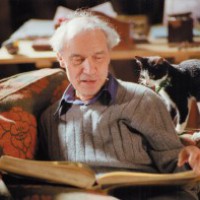Rivette is a French director and screenwriter, one of the key representatives of the French
New Wave, with strongly leanings toward experimentalism. In 1950, he began writing film critiques for the magazine
Gazette du Cinema, edited by Éric Rohmer. In parallel with writing, he directed his first short films
Aux quatre coins (1949),
Le quadrille (1950) and
Le divertissement (1952). In 1952, he began to write for
Cahiers du cinema, at the time edited by Andre Bazin and Jacques Doniol-Valcroze. In the time between 1952 and 1953, besides Rivette other future representatives of the New Wave gathered around the magazine: Jean-Luc Godard, François Truffaut, Claude Chabrol and Éric Rohmer. With the first three, Rivette acted in the short film
Le coup du berger (1956), which he also directed. At the time, he worked as an assistant director to Jean Renoir and Jacques Becker, and in his film critiques especially praised American directors from 1940s and 1950s: Howard Hawks, John Ford, Nicholas Ray and Fritz Lang. He began directing his first feature film
Paris Belongs to Us (Paris nous appartient, 1960) in 1958 with his own money and finished it two years later. His next, more commercial film,
The Nun (La religieuse, 1966) is a film adaptation of Diderot’s novel that was banned for two years because of the way it depicted the Catholic Church. In his next films,
L'amour fou (1969), the thirteen-hour-long
Out 1, noli me tangere (1972 - the film was edited, shortened and released in 1974 under the title
Out 1: Spectre) and
Celine and Julie Go Boating (Céline et Julie vont en bateau - Phantom Ladies Over Paris, 1974) he showed one of his main characteristics – combining tequniques from documentary, improvisation, fiction and non-linear storytelling as well as a tendency to make quite long films, which is why his films were rarely shown. In 1976, he got an offer to make a series of four films
Les Filles du Feu and made the first one
Duelle (1976). Due to very bad reviews, the second film,
Noroît (1976), was never even released and the last two were never made. Afterwards, he made the short film
Paris s'en va (1981), feature films
Le pont du Nord (1981),
Merry-Go-Round (1981),
Love on the Ground (L'amour par terre, 1984) and
Hurlevent (1985), a film adaptation of Emily Brontë’s
Wuthering Heights, but none of the films were much liked either by audiences or critics. However, that changed with
The Gang of Four (La bande des quatre, 1988), which won the FIPRESCI Award in Berlin in 1989, and
La belle noiseuse (1991), which won the Jury’s Award in Cannes in 1991. The latter, originally lasting 236 minutes, was released in a shorter, two-hour-long version under the title
Divertimento (1991). He also made a two-part film about the life of Jeanne D’Arc:
Jeanne la Pucelle I - Les batailles (1994) and
Jeanne la Pucelle II - Les prisons (1994), a musical set in Paris
Up, Down, Fragile (Haut bas fragile, 1995), the crime drama
Secret défense (1998) and
Va Savoir (Who Knows?) (2001) one of the most acclaimed films of his later phase. His most recent three films are
The Story of Marie and Julien (Histoire de Marie et Julien, 2003), the historical drama
The Duchess of Langeais (Ne touchez pas la hache, 2007) and
Around a Small Mountain (36 vues du Pic Saint Loup, 2009).
Filmography
36 vues du Pic Saint Loup (2009)
Ne touchez pas la hache (2007)
Histoire de Marie et Julien (2003)
Va savoir (2001)
Secret défense (1998)
Lumière et compagnie (1995) (segment Jacques Rivette/Paris)
Haut bas fragile (1995)
Jeanne la Pucelle II - Les prisons (1994)
Jeanne la Pucelle I - Les batailles (1994)
Divertimento (1991) (edited, shorter version La belle noiseuse)
La belle noiseuse (1991)
La bande des quatre (1988)
Hurlevent (1985)
L'amour par terre (1984)
Merry-Go-Round (1981)
Le pont du Nord (1981)
Paris s'en va (1981) (short film)
Noroît (1976)
Duelle (une quarantaine) (1976)
Céline et Julie vont en bateau - Phantom Ladies Over Paris (1974)
Out 1: Spectre (1974) (edited and shortened Out 1, noli me tangere)
Naissance et mont de Prométhée (1974) (short)
Essai sur l'agression (1974) (short)
Out 1, noli me tangere (1971)
L'amour fou (1969)
La religieuse (1966)
Paris nous appartient (1960)
Le coup du berger (1956)
Le divertissement (1952)
Le quadrille (1950)
Aux quatre coins (1949)
